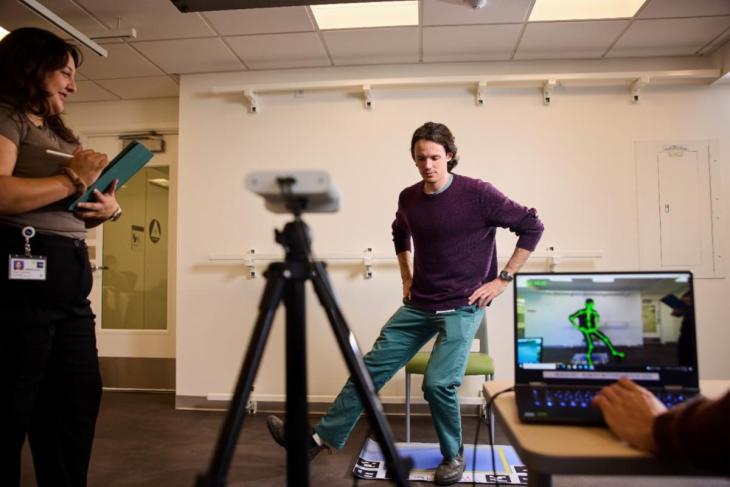Located on the western periphery of the UCSF Parnassus campus, the METRiCS lab at 95 Kirkham conducts research focused on identifying clinically relevant biomechanical phenotypes and probing potential interactive mechanisms among various musculoskeletal pain phenotypes. Here, graduate student Alexis Camacho, at left, conducts studies with clinical research coordinator Nick Harris. (Photo: UCSF Department of Orthopaedic Surgery)
SAN FRANCISCO (March 26, 2024) -- The UCSF Department of Orthopaedic Surgery is delighted to announce the opening of the METRiCS (Musculoskeletal Research Consortium) lab space at 95 Kirkham Street , located on the UCSF Parnassus campus in San Francisco. Led by Jeannie Bailey, PhD , the lab will focus on advancing sensor and motion capture related research, as well as fostering collaborations with other departments.
Originally constructed in the 1950s, the facility underwent a full renovation , which was completed at the end of 2023. The project included a seismic retrofit, modernized infrastructure, and the installation of a dry lab and support space suite; the building also houses upgraded offices, conference rooms, breakrooms, and an outdoor public garden.
Located at the intersection of Fifth Avenue and Kirkham Street in the Inner Sunset neighborhood, the lab conducts innovative research focused on identifying clinically relevant biomechanical phenotypes and probing potential interactive mechanisms among various musculoskeletal pain phenotypes. Dr. Bailey, an assistant professor, and her lab actively develop, test, and implement precision-based digital health technology to enhance engagement in treatment and recovery for clinicians and patients alike.
Examples of current collaborative efforts include: the development of in-clinic biomechanical assessments and smartwatch-based flare episode prediction for chronic low back pain patients, as part of the REACH initiative; and the creation of a biomechanical assessment mobile app called OrthoCap, developed in collaboration with spine surgeon Bobby Tay, MD .
"Through initiatives like OrthoCap, Dr. Bailey is pioneering the remote assessment of patient motion quality and constructing models to forecast long-term surgical outcomes during preoperative and early recovery stages," said Dr. Tay, who also serves as the Department’s vice chair of quality and safety.
The METRiCS space also accommodates Robert Matthew, PhD , an assistant professor in the Department of Physical Therapy and Rehabilitation Sciences, who is involved in developing biomechanical assessment tools for the REACH project . Dr. Matthew is also spearheading a research program aimed at creating motion assessment tools for neurorehabilitation in stroke and spinal cord injury patients.
"We are excited to support both Dr. Bailey and Dr. Matthew, who have established a longstanding collaboration in advancing in-clinic biomechanical assessments for orthopedic surgery patients," said Jeffrey Lotz, PhD , who serves as the Department’s vice chair of research. "Their ongoing research efforts have been recognized with NIH funding for the REACH Physical Function and Biomechanics Research Core."
"This initiative aligns with our mission to provide a secure and conducive environment for cutting-edge research and innovation within the UCSF community," said C. Benjamin Ma, MD , Chair of the Department. "Its development marks a significant stride forward in UCSF's commitment to advancing orthopaedic research and innovation as well as fostering a dynamic environment for scientific exploration and discovery."
